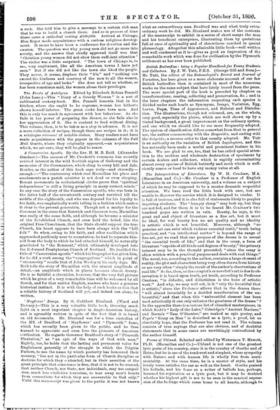A Cameronian Apostle. By the Rev. H. M. B. Reid.
(Alexander Clardner.)—The success of Mr. Crockett's romances has recently revived interest in the wild Scottish region of Galloway and the memories of the Covenanters, which ding to every hill and dale. Besides, as the author of this book says truly—and shrewdly— enough :—" The controversy which cost Macmillan his place and emoluments as a parish minister is not dead or even sleeping. Recent movements in ecclesiastical circles prove that 'spiritual independence' is still a living principle in many earnest minds." In any case the story of the Cameronian apostle, who was born in the latter half of the seventeenth century and survived till the middle of the eighteenth, and who was deposed for his loyalty to his faith, was emphatically worth telling in a fashion which makes it clear to the present generation. Though not a martyr for the Covenant in the sense that Renwick and Cameron were, Macmillan was really of the same faith, and although he became a minister of the Established Church, and even held the belief, like the original Free Churchmen, that the State should support the true Church, his heart appears to have been always with the "hill folk" So when, owing to his faith, and after vacillation which approached perilously near to recantation, he had to separate him- self from the body to which he had attached himself, he naturally gravitated to "the Remnant," which ultimately developed into tho Reformed Presbyterian Church of Scotland. He justified the title of "Cameronian apostle" which his biographer has given him, for he did a work among the "congregations" which in point of "strenuosity" recalls that of John Wesley in his early days. Mr. Reid tells the story of Macmillan with the utmost amplitude of detail,—an amplitude which in places becomes almost dreary. He is so faithful a chronicler, however, that the very full picture which he gives of a very remarkable time will be welcomed by all Scotch, and for that matter English, readers who have a genuine historical instinct. It is with the help of such books as this that a reliable history of Scotland will yet, and indeed can alone, be written.










































 Previous page
Previous page